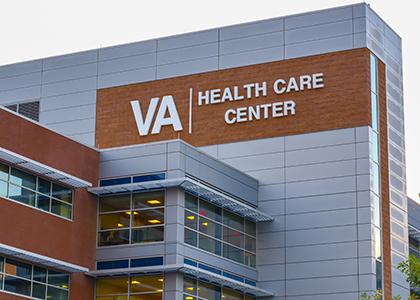UCLA Law’s Veterans Legal Clinic co-authors a report on the impact of policing in veterans’ healthcare

UCLA School of Law’s Veterans Legal Clinic and Disability Rights California (DRC), in partnership with the National Association of Minority Veterans of America (NAMVETS), have released an investigative report that addresses concerns that veterans have raised about policing within veterans affairs (VA) health centers.
Co-written by students in the law school’s Veterans Legal Clinic, the report, “Unmasking Policing in Veterans Healthcare: Advocating for Equitable Access to Services for Disabled and Unhoused Veterans,” uses data and police records that were never previously released to the public to illustrate ways in which VA policing may hinder access to services and result in racial profiling and violence against disabled or unhoused veterans.
The Veterans Affairs Police Department (VAPD) of the U.S. Department of Veterans Affairs is one of the largest federal administrative law enforcement agencies. The report details how VAPD officers play a significant role in veteran patients’ experiences. Because of this role, advocates are concerned that the VAPD is inappropriately enmeshed in veterans’ healthcare.
UCLA Law clinic students took a leading role in drafting the report and reviewing police reports that were released to the clinic and NAMVETS following a Freedom of Information Act request.
“The narratives and statistics we highlight show VAPD interactions can negatively impact veterans who are seeking care,” says co-author Claire Canestrino ’25. “The violence and legal repercussions that can result from these encounters can interfere with a veteran’s ability to access the healthcare and services to which they are entitled.”
Canestrino, her classmates and supervising attorneys analyzed VAPD incident reports to corroborate media accounts of broad use of police discretion within VA facilities.
The report is part of a series examining police encounters at four VA healthcare system locations: Los Angeles; Columbus, Ohio; Tampa, Florida; and Queens, New York. It highlights the effects of police discretion on veterans’ access to medical care, including throughout the COVID-19 pandemic. Instead of healthcare professionals, police are often dispatched to make welfare checks and respond to mental disabilities, behavioral health or substance use situations.
Analysis reveals that the VAPD’s heavy policing of the physical spaces and surrounding areas of VA healthcare facilities create an environment inhospitable to veterans’ care. Unhoused veterans, veterans with a mental health diagnosis, disabled veterans and veterans of color, especially Black veterans — all of whom are more likely to be perceived as disruptive and therefore face federal penalties — are disproportionately affected by policing on VA campuses.
“Black veterans have reported feeling singled out by the VA police while trying to get healthcare,” says Horace Walker Jr., director of NAMVETS’s national veterans claims center. “The VA should be a sanctuary for veterans, not a place where we experience police harassment. We hope the report will shed light on one aspect of structural racism Black veterans face at the VA.”
The report notes, “Instead of having a safe space to receive medical treatment and just be, veterans are sometimes criminalized and mistreated.”
“The VAPD’s mission is to ‘protect those who served.’ Yet this report highlights that this mission is not a reality for a significant number of veterans, particularly veterans of color and those who are unhoused or have disabilities,” says Aisha Novasky, a senior attorney with DRC. “We urge the VA to end its practice of needlessly criminalizing our nation’s heroes and instead fulfill its promise to support veterans by providing them with the tools they need to survive and thrive.”
The report categorizes incident types that were largely consistent at all four locations. It also provides a comparison over time, showing that despite the decline in medical services during the COVID-19 pandemic, the rate of policing at VA facilities remained stable.
Ultimately, the report emphasizes the need to reconsider the role of policing on VA campuses to better serve veterans who seek medical care there. The clinic and its partners plan to release more reports based on additional records that the federal government produces.